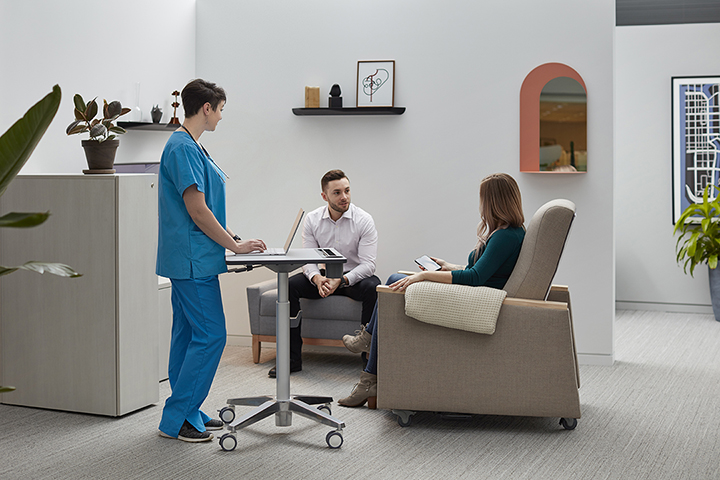Innovations in Healthcare Furniture
Innovations in healthcare furniture are transforming patient care and caregiver environments. Modern designs embrace technology and sustainability to emphasize safety, functionality, comfort and aesthetics.
Our guide explores the latest trends in healthcare furniture, from ergonomic design principles to tech integration. We’ll also explore key considerations for the furniture essential to patient and treatment rooms, waiting areas and administrative spaces.
Ergonomic Design
Modern healthcare settings increasingly use ergonomic design to enhance comfort, efficiency and well-being for patients, visitors and staff.
Examples of ergonomic hospital furniture include adjustable seating that promotes proper posture or height adjustable desks that minimize strain during long working hours. By reducing physical discomfort, ergonomic furniture helps improve focus and productivity.
Additionally, aesthetically pleasing designs with calming colors, curved edges, and a welcoming feel help create relaxing, healing environments in hospitals and other healthcare environments. Research shows that certain colors, like blue and green, have a pain-reducing effect.
Infection Control
Infection control remains a top priority in healthcare settings, especially given the heightened awareness following the Covid-19 pandemic.
Unlike offices, classrooms or residential spaces, healthcare environments require cleaning multiple times a day. Regular cleaning protects vulnerable patients and prevents the spread of germs.
Easy-to-clean furniture enhances hygiene and safety by making it simpler to maintain a sanitary environment.
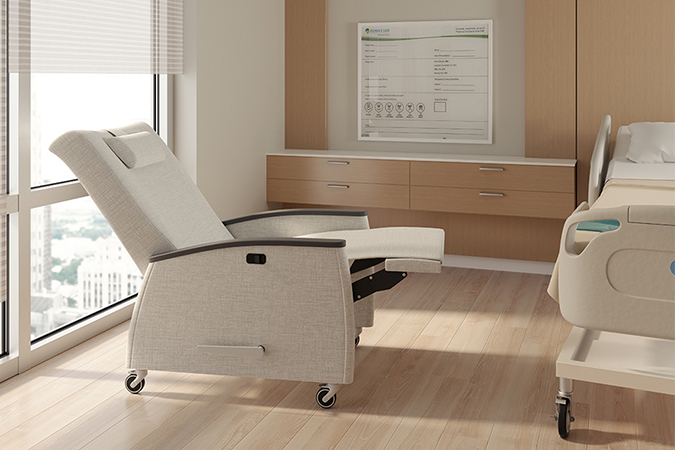
For example, the clean, uninterrupted surfaces of the Suspend recliner series from IOA Furniture make these recliners infection-control-friendly. The Suspend uses cutting-edge foam and suspension technology to offer users long-term comfort in various positions.
Viruses can live on nonporous surfaces like stainless steel and plastic for up to a week, while bacteria like Clostridium difficile can survive on hard surfaces for up to five months.
To fight these germs, some manufacturers offer antimicrobial furniture, like Carolina’s Silvr Ion Metal collection. The furniture range has silver ion technology embedded into its surface for a comprehensive antimicrobial defense system.
Stain-resistant furniture further supports overall cleanliness by preventing marks and spills from impacting the appearance and functionality of products. Healthcare furniture must also be durable enough to withstand frequent cleaning.
Space Optimization and Layout Planning
Maximizing space in healthcare settings is vital, as limited square footage becomes more challenging with growing populations and busier hospitals.
Space-saving healthcare furniture solutions like folding wall beds, modular seating systems and moveable partitions help optimize layouts while ensuring patient comfort and privacy.
Meanwhile, built-in storage in administrative offices and examination rooms can streamline workflows, keeping essential tools and supplies organized.
Healthcare environments must also comply with the Americans with Disabilities Act (ADA) accessibility standards. These dictate certain requirements for layouts, such as accessible routes and adequate turning spaces for wheelchair users.
Additionally, ADA-compliant furniture ensures an equitable space for all patients, including those with disabilities.
Modular Healthcare Furniture
Flexible, modular furniture ensures healthcare environments are adaptable to the constantly evolving needs of patients and visitors. These designs allow for easy reconfiguration and accommodate various scenarios without permanent fixtures.
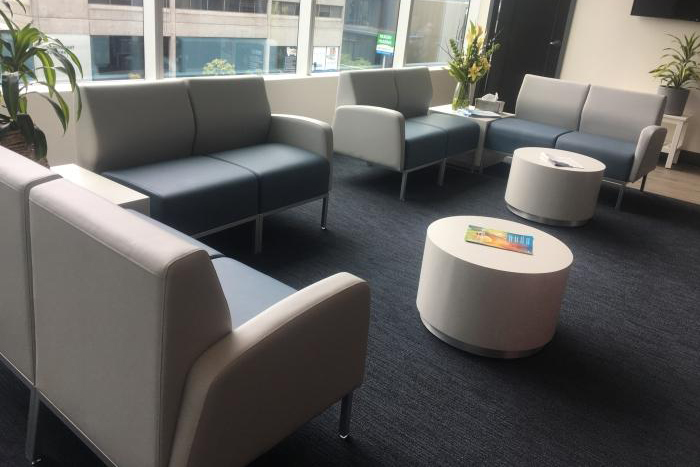
For example, Spec’s Tailor Modular series offers flexible seating arrangements, with units that can stand alone or link together to create seamless configurations.
Meanwhile, the Wieland Perk folding chair provides extra seating for visitors in patient rooms without occupying permanent space. Its removable seat cushions and engineered resin material make cleaning simple.
Environmental And Sustainable Healthcare Furniture
Healthcare organizations are increasingly purchasing furnishings that align with their environmental and sustainability goals.
In response, healthcare furniture suppliers are offering product lines that use organic materials, such as chitosan (crushed seashell) composites, and eco-friendly fabrics made from recycled plastic.
Many modern healthcare furnishings carry green certifications like Leadership in Energy and Environmental Design (LEED) and GreenGuard. These certifications ensure that products meet strict chemical emission standards and contribute to healthier, more efficient and cost-effective environments.
Technology Integration in Healthcare Furniture
Healthcare facility furniture continues to incorporate smart technology, enhancing functionality and convenience. This futuristic furniture meets strict healthcare compliance standards and features advanced sensors and Internet of Things (IoT) connectivity.
The IoT links devices and systems, allowing for seamless data exchange. The rise of wearable devices in healthcare aligns with this connectivity. These tools offer physicians continuous, accurate monitoring of health metrics, leading to more personalized, proactive patient care.
For example, smart beds can monitor vital signs like weight, body temperature and heartbeat and include sensors for blood, oxygen and pressure. Sensor-enabled furniture improves patient monitoring and safety by detecting potential risks and falls.
Many modern clinical furniture designs also include charging stations and tech-friendly elements to keep medical equipment and personal devices powered and accessible.
Furniture For Different Healthcare Spaces
Patient Room Furniture
In patient rooms, functional, comfortable furniture is crucial for supporting patients who are recovering from an illness or procedure or receiving palliative care. Modern hospital beds equipped with built-in controls and safety rails offer optimal comfort and adjustability.
Overbed tables are also essential, as they provide versatile surfaces for meals and activities while a patient is seated or lying down.
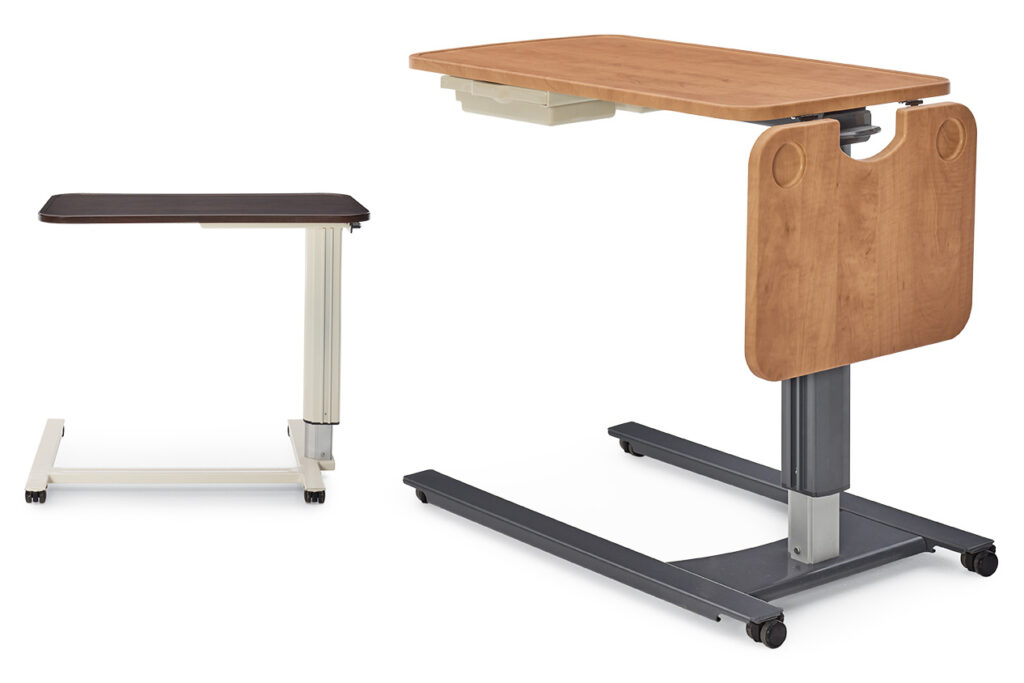
Global Furniture Group offers a variety of overbed table tops and base shapes, with optional accessories such as storage baskets and locking casters.
Meanwhile, wardrobes and storage solutions help keep patient rooms clutter-free, reducing the risk of hospital-acquired infections. A clutter-free environment is crucial in clinical settings, as excess items can harbor germs and have a negative impact on mental health.
Patient recliners and treatment chairs should offer maximum comfort, with adjustable settings to suit various body sizes, needs and preferences.
For example, Haworth’s supportive, intuitive Benson patient recliners are ideal for acute care, cardiac recovery and orthopedic patient rooms. They also suit infusion, neonatal and postpartum rooms.
Meanwhile, Carolina’s Saven rocker provides ideal support for new mothers and their babies. Available in four ergonomic designs and a range of materials, the chair’s gentle rocking motion calms and soothes users with a variety of needs.
It’s important to consider additional requirements for specific settings, such as behavioral health facilities. These environments may need tailored features for enhanced safety and support. For instance, ligature-resistant furnishings or seating with armrests to aid with sitting and rising.
Waiting Room Furniture
Anyone who has spent time in a healthcare waiting room knows these can be nerve-wracking environments. Thoughtful medical furniture choices in waiting areas can create reassuring, comfortable spaces where people can sit before appointments or while accompanying loved ones.
Chairs, sofas and benches should prioritize comfort and accessibility, with ergonomic designs and flexible options that adapt to space requirements and patient volume.
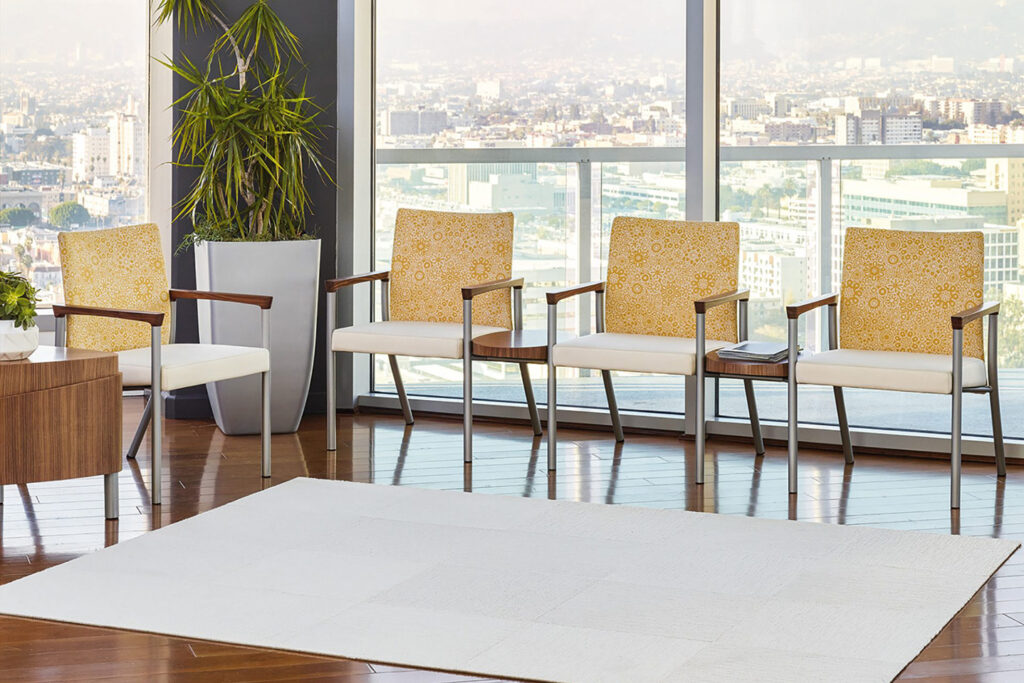
The Soleil Guest collection from Arcadia is an excellent choice for both short- and long-term waiting needs. Available in guest, bariatric, patient and hip chair models, these vibrant, stylish designs come in a range of premium finishes.
Additionally, tables contribute to the functionality of waiting areas, offering surfaces for patients to place personal items and read. The Soleil Guest range includes stylish occasional tables and connecting tables in various shapes.
Waiting room designs should also include welcoming reception spaces that support both patients and staff. As the first point of contact for visitors, reception desks should offer well-organized spaces for staff to efficiently manage check-ins and inquiries.
Treatment Room Furniture
In treatment rooms, examination tables and medical cabinets play a key role in creating an efficient, comfortable environment for both patients and staff.
Groupe Lacasse offers high-quality exam room modular casework from Neocase, including floating storage units and work surfaces with built-in sinks. These sleek solutions help create treatment rooms that enhance patient well-being and support outstanding healthcare delivery.
Physicians and caregivers frequently work long hours, including overnight shifts and weekends. Ergonomic furniture that supports their health and well-being is just as vital as the equipment they use.
Carolina’s Stray physician stool is a dynamic option for healthcare professionals who spend extended shifts in treatment rooms. The stool’s unique features include a pneumatic lift ring around the bottom of the seat for effortless height adjustment.
Haworth’s Soji Cleanable+ is another thoughtfully designed, innovative ergonomic seating solution for environments that undergo frequent cleaning. Staff can disinfect the chair’s faux-leather back with a bleach solution that meets strict cleaning protocols.
Administrative Furniture
Administrative spaces handle the behind-the-scenes tasks that keep healthcare facilities running smoothly. Well-designed furniture can transform work efficiency and organization in these areas.
![]()
![]() For example, ergonomic office chairs like the Haworth Zody LX Chair ensure comfort and support for administrative staff throughout long hours. The easy-to-clean chair has several customization options, including a dual posture feature and flexible lumbar support.
For example, ergonomic office chairs like the Haworth Zody LX Chair ensure comfort and support for administrative staff throughout long hours. The easy-to-clean chair has several customization options, including a dual posture feature and flexible lumbar support.
Meanwhile, desks and workstations should prioritize organization and support staff to work freely and dynamically. Wall-mounted and adjustable workstations and monitor arms, such as those available from Ergotron, improve flexibility and efficiency for healthcare staff.
Safeguarding patient confidentiality is integral in administrative spaces. Filing and storage cabinets provide seamless, secure organization for important documents, contributing to a well-ordered, productive workspace.
Innovative Healthcare Furniture Solutions
At WB Wood, we understand the impact that well-designed spaces can have on the lives of those who use them. As a top furniture services provider and project management firm, we’ve delivered many exceptional, human-centric solutions for healthcare settings across North America.
Contact us to find out how we can support your healthcare project.

